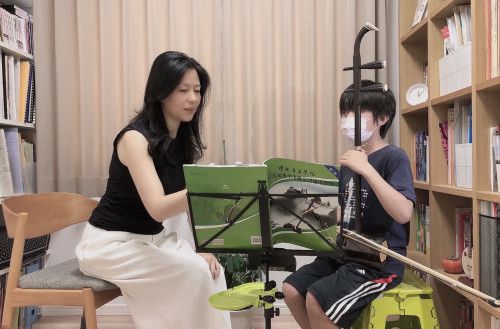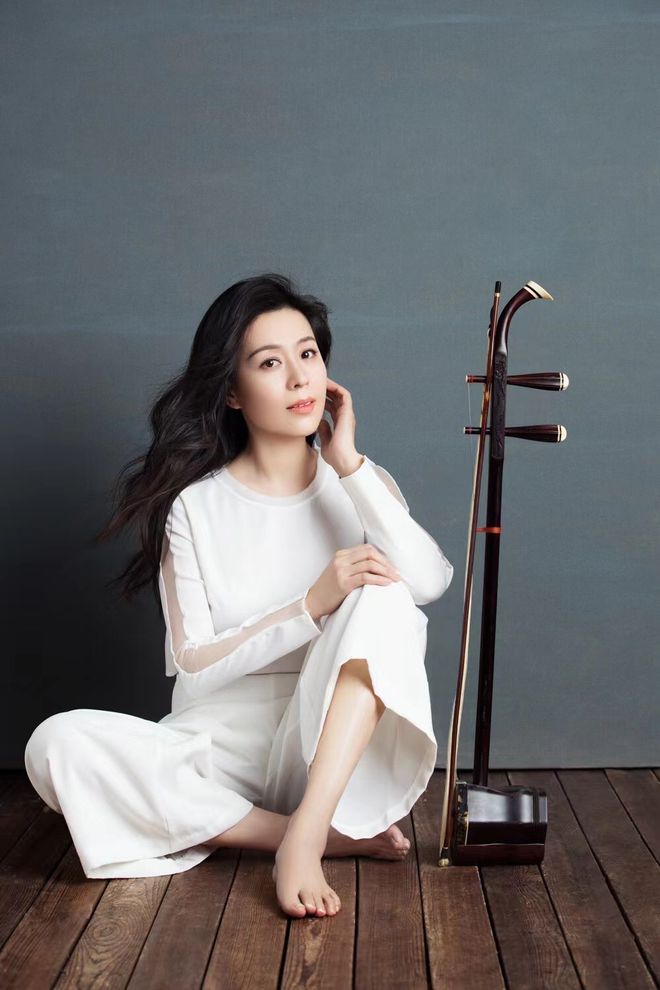Huo Xiaojun: Erhu makes more Japanese fall in love with traditional Chinese musical instruments
Twenty-one years ago, an orchestra composed of girls was established in Beijing and has been active on the domestic and international stage since then. This is known as the "Twelve Girls Band". The protagonist of this article, Huo Xiaojun, an erhu performer in Japan, is the first member of the "Twelve Women's Band". In the past 20 years, she has continuously conveyed the charm of traditional Chinese musical instruments to her neighbors by teaching Erhu.
In the celebration of the 50th anniversary of the normalization of diplomatic relations between China and Japan, Huo Xiaojun will join hands with Japan's famous Matsuyama Ballet to bring the audience the classic Chinese ballet "The White-Haired Girl".
Neighbors with a strip of water are deeply fascinated by stringed instruments
Huo Xiaojun was born in Tianjin and is a national first-class performer. She began to study erhu at the age of 8. Due to her outstanding performance, she successfully entered the China Opera and Dance Theatre after graduating from university. In 2001, she was invited to join the "Twelve Girls Band" and became "the only member of the group who did not sign a contract". . Although Huo Xiaojun did not personally experience the glory of Lefang in Japan, this status has made her highly recognized in Japan. Many Japanese music lovers have experienced the charm of erhu through the "Women's Twelve Band", and thus know themselves.
Before coming to Japan, Huo Xiaojun, as the orchestra's chief performer, often performed overseas with the orchestra. The first time I became attached to Japan was in 1992. At that time, Huo Xiaojun, accompanied by a school teacher, went abroad for the first time. Although it has been 30 years, when she mentioned the experience of performing in Japan for the first time, she still remembers being deeply moved by the modern street scene when she visited Ginza at that time. Although she has traveled to many countries with the group, the clean and modern image of Japan is still a lingering memory in her mind.
In 2001, Huo Xiaojun opened an erhu classroom for Japanese people in Beijing, and for the first time discovered the Japanese people's deep love for erhu. Huo Xiaojun explained that Japan also has its own traditional musical instruments, but there are no stringed instruments among them. Generally, Japanese people are more familiar with the timbre of traditional Chinese instruments such as Guzheng and Xiao, but after hearing the erhu, they are not only amazed, but also attracted by the wonderful timbre that is sometimes high-pitched and sometimes sad.

▲Huo Xiaojun who is teaching students (Huo Xiaojun's personal website)
Since then, Huo Xiaojun has established a deep connection with Japan through the erhu. In 2010, she released her first Erhu solo CD in Japan and made her debut. In 2013, she attended the performance of the Japan Earthquake Disaster Charity Gala, and has since performed in Fukuoka and Nara many times.
In 2016, Huo Xiaojun's Japanese Erhu Classroom was officially opened in Tokyo. She told this reporter that the students in the erhu classroom are mainly Japanese, ranging from children to 80-year-olds. Among them, the elderly aged 60 to 80 account for about half of the number of students. Previously, when teaching in China, the proportion of children was relatively large, and many children were sent by their parents to learn erhu. Domestic parents are more concerned about their children's further education, or hope that their children will have a hobby. Most Japanese students simply like the erhu instrument, and have no other purpose. Therefore, the age span of Japanese students will be larger.
Huo Xiaojun said that although he teaches in Japanese all the year round, he is only familiar with the Japanese taught, and he also thanks to the help of Japanese students in his daily life. When the erhu course for Japanese was opened in Beijing, "At the beginning of the class, I could only use gestures to teach the class. Later, because the Japanese students who came to the class lived in China and needed to learn Chinese, I also started to learn Japanese a little bit. That starts to learn from each other.”
After coming to Japan, my daily life benefited more from the help of Japanese students. Among them are some Japanese students who had taught in Beijing and who have not lost contact after returning to Japan. Some students saw news of Huo Xiaojun's opening of an erhu classroom in Japan on Facebook and other social media, and would immediately ask for help. With Huo Xiaojun, Erhu solved her communication barriers with Japanese students and became a bridge connecting China and Japan.

▲National first-class performer, member of the first phase of the Women's Twelve Band, Huo Xiaojun (photo courtesy of the interviewee)
The evening party, expecting famous songs to surprise the audiences of both countries
It is not the first time that Huo Xiaojun has participated in the commemorative party for the normalization of diplomatic relations between China and Japan. As early as 2017, Huo Xiaojun was invited by the embassy to participate in the 45th anniversary of the normalization of Sino-Japanese diplomatic relations, and performed in front of the late Japanese Prime Minister Shinzo Abe. When asked about his views on the party, Huo Xiaojun said: "It is a rare opportunity to present traditional Chinese culture and art to foreigners through traditional Chinese musical instruments. Compared with literature and poetry, music can make it easier for the audience to understand us. Chinese traditional culture, through some traditional Chinese repertoire, and through the performance of the erhu, even foreign audiences can experience the freehand brushwork of Chinese landscapes.”
According to Huo Xiaojun, compared with the 45th anniversary party, this party is larger in scale and has more variety of performances. In addition to the "White-Haired Girl" with the Matsuyama Ballet, there is also an ensemble with flute and another Japanese song.
Huo Xiaojun is very happy and looking forward to the upcoming performance of "The White-Haired Girl". This is because the first generation of "The White Haired Girl" in China was born in the China Opera and Dance Theatre where Huo Xiaojun worked before; and "The White Haired Girl", as the first Chinese opera, was highly valued at that time, Zhou Enlai and others National leaders have all come to guide. At the same time, "The White-Haired Girl" was one of her most frequently performed pieces during her troupe. She was very moved to be able to re-perform her familiar and meaningful repertoire in a foreign country at the 50th anniversary of the normalization of diplomatic relations between China and Japan. Huo Xiaojun also hopes that the performance can bring surprises to everyone on the day of the performance, and hope that the audience can enjoy the performance.
 渝公网安备 50010702504639号
渝公网安备 50010702504639号